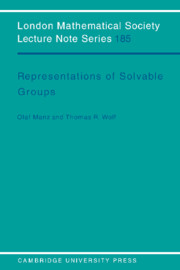Book contents
- Frontmatter
- Contents
- Preface
- Acknowledgments
- Chap. 0 Preliminaries
- Chap. I Solvable subgroups of linear groups
- Chap. II Solvable permutation groups
- Chap. III Module actions with large centralizers
- Chap. IV Prime power divisors of character degrees
- Chap. V Complexity of character degrees
- Chap. VI π-special characters
- References
- Index
Chap. VI - π-special characters
Published online by Cambridge University Press: 23 September 2009
- Frontmatter
- Contents
- Preface
- Acknowledgments
- Chap. 0 Preliminaries
- Chap. I Solvable subgroups of linear groups
- Chap. II Solvable permutation groups
- Chap. III Module actions with large centralizers
- Chap. IV Prime power divisors of character degrees
- Chap. V Complexity of character degrees
- Chap. VI π-special characters
- References
- Index
Summary
Factorization and Restriction of π-Special Characters
For p-solvable groups G, the Fong–Swan Theorem (Cor. 0.33) states that each φ ∈ IBrp(G) can be lifted to some χ ∈ Irr(G). Isaacs [Is 4, 5] showed the existence of a “canonical” lift. An important role in this lift is played by “p′-special” characters. For a set of primes π, we may likewise define “π-special” characters, which were developed by Gajendragadkar [Ga 1] and Isaacs [Is 6]. Let G be π-separable. Then any primitive ψ ∈ Irr(G) necessarily factors ψ = ψ1ψ2 as a product of a π-special character ψ1 and π′-special character ψ2- Furthermore for H ∈ Hallπ(G), restriction defines an injection from the set of π-special characters of G into Irr(H). This concept yields a powerful tool for studying problems in the character theory of solvable groups. Then namely any primitive character χ factors χ = Πpχp as a product of p-special characters χp, each of which very much “behaves” like an irreducible character of a p-group. We use this approach in Section 22, where we give a proof of a conjecture of W. Feit.
Recall that when η ∈ Char(G), then the order of the linear character det(η) is denoted by o(η). For convenience, we restate Theorem 0.13, which is of central importance here.
Lemma. Suppose that N ⊴ G, θ ∈ Irr(N) is invariant in G and (o(θ) · θ(1),|G/N|) = 1. Then there is a unique extension X of θ to G satisfying (o(χ), |G/N|) = 1. In fact, o(χ) = o(θ).
Recall that χ is called the canonical extension of θ to G.
- Type
- Chapter
- Information
- Representations of Solvable Groups , pp. 265 - 292Publisher: Cambridge University PressPrint publication year: 1993

